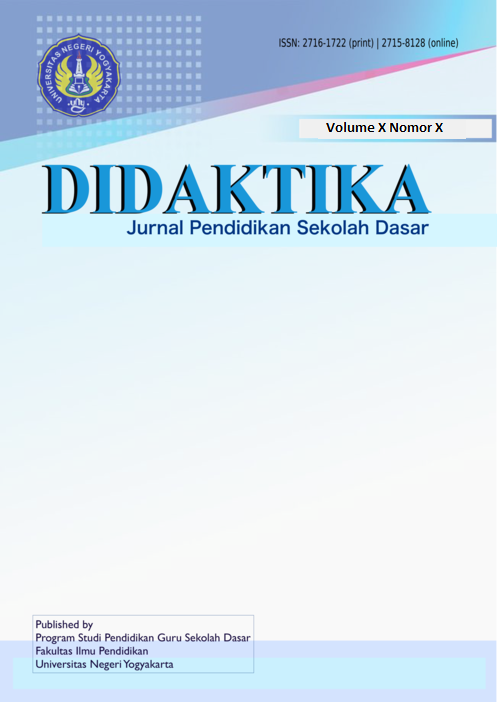School Culture to Build Environmental Awareness in SD N Krebet before and during the Pandemic Season
DOI:
https://doi.org/10.21831/didaktika.v4i2.41031Abstract
Caring for the environment is one of the visions of SD N Krebet Pajangan Kulon Progo. In the pandemic season, the school culture has experienced very significant changes in the learning process and other school activities. The purpose of this study is to describe how to build environmental awareness of Pre and during the Pandemic Season in SD N Krebet. This study uses an approach qualitative which is included in the intricic case research class with descriptive analysis. The data collection technique is carried out namely observation to determine conditions updates, documentation, and interviews with informants to get data about the conditions of learning and culture school before and during pandemic season. Based on the results of the study, it can be concluded that the implementation of school culture that supports the realization of a vision of environmental awareness is very different in its management both pre and during a pandemic. The management of school culture is seen from the aspects of program planning, implementation and evaluation. When pre-pendemic management to build environmental awareness is carried out more varied, whereas during a pandemic, the management of school culture tends to emphasize knowledge and advice only, but there are some life skills that are taught, namely making masks and using used items as soap containers to wash hands.
References
Anggraeni, P., & Akbar, A. (2018). Kesesuaian Rencana Pelaksanaan Pembelajaran Dan Proses Pembelajaran. Jurnal Pesona Dasar, 6(2), 55–65. https://doi.org/10.24815/pear.v6i2.12197
Anugraheni, I. (2018). Pengembangan Perangkat Pembelajaran Matematika Berbasis Pendidikan Karakter Kreatif Di Sekolah Dasar. Refleksi Edukatika : Jurnal Ilmiah Kependidikan, 8(2). https://doi.org/10.24176/re.v8i2.2351
Beti Istanti and Nafi Isbadrianingtyas. (2017). Peran Budaya Sekolah dalam Pembentukan Karakter Anak Sekolah Dasar. Prosiding SENASGABUD. E-ISSN 2599-8406. 34–41.
Darmono, A. (2020). Best Paractice Pembelajaran Daring Di Madrasah Ibtidaiyah Pada Masa Pandemi Covid 19. Jurnal Kurikula, 34–48. http://ejournal.iaingawi.ac.id/index.php/kurikula/article/view/465
Hadi, S. (2017). Pemeriksaan Keabsahan Data Penelitian Kualitatif pada Skripsi. Jurnal Ilmu Pendidikan Universitas Negeri Malang, 22(1). https://doi.org/10.17977/jip.v22i1.8721
Ham, M., MrÄela, D., & Horvat, M. (2016). Insights For Measuring Environmental Awareness. Ekonomski Vjesnik / Econviews : Review of Contemporary Entrepreneurship, Business, and Economic Issues, 29(1).
Harun, C. Z. (2013). Manajemen Pendidikan Karakter. Jurnal Pendidikan Karakter, 0(3). https://doi.org/10.21831/jpk.v0i3.2752
Lestari, R.Y. (2016). Peran Kegiatan Ekstrakurikuler Dalam Mengembangkan Watak Kewarganegaraan Peserta Didik. Untirta Civid Education Journal. 1(2), 136-152
Mohamad, M. M., Ibrahim, B., Lai, C. S., Ahmad, A., & Nasir, A. N. M. D. (2020). Reflection on environmental awareness for school management. In Journal of Critical Reviews (Vol. 7, Issue 6). https://doi.org/10.31838/jcr.07.06.46
Murniningsih, M., & Norah, S. (2019). Hubungan Pengetahuan Pencemaran Lingkungan dan Agama dengan Perilaku Ramah Lingkungan Mahasiswa. Quantum: Jurnal Inovasi Pendidikan Sains, 10(2). https://doi.org/10.20527/quantum.v10i2.6135
Purwanti, D. (2017). Pendidikan Karakter Peduli Lingkungan dan Implementasinya. DWIJA CENDEKIA: Jurnal Riset Pedagogik, 1(2). https://doi.org/10.20961/jdc.v1i2.17622
Sudrajat, A. (2011). Mengapa Pendidikan Karakter. Jurnal Pendidikan Karakter, I(1). https://doi.org/10.21831/jpk.v1i1.1316
Susongko, P., & Afrizal, T. (2018). The determinant factors analysis of Indonesian students' environmental awareness in pisa 2015. Jurnal Pendidikan IPA Indonesia, 7(4). https://doi.org/10.15294/jpii.v7i4.10684
YeÅŸilyurt, M., BalakoÄŸlu, M. í–., & Erol, M. (2020). The impact of environmental education activities on primary school students' environmental awareness and visual expressions. Qualitative Research in Education, 9(2). https://doi.org/10.17583/qre.2020.5115
Yuliana, K., Saptono, A., & Cahyaningsih, N. (2020). Analisa Pemanfaatan Google Custom Search Pada Website Yufid.com dengan Metode Kualitatif Deskriptif. ICIT Journal, 6(1). https://doi.org/10.33050/icit.v6i1.861
Downloads
Published
How to Cite
Issue
Section
Citation Check
License
- Authors retain copyright and grant the journal right of first publication with the work simultaneously licensed under a Creative Commons Attribution License that allows others to share the work with an acknowledgement of the work's authorship and initial publication in this journal.
- Authors are able to enter into separate, additional contractual arrangements for the non-exclusive distribution of the journal's published version of the work (e.g., post it to an institutional repository or publish it in a book), with an acknowledgement of its initial publication in this journal.
- Authors are permitted and encouraged to post their work online (e.g., in institutional repositories or on their website) prior to and during the submission process, as it can lead to productive exchanges, as well as earlier and greater citation of published work.






